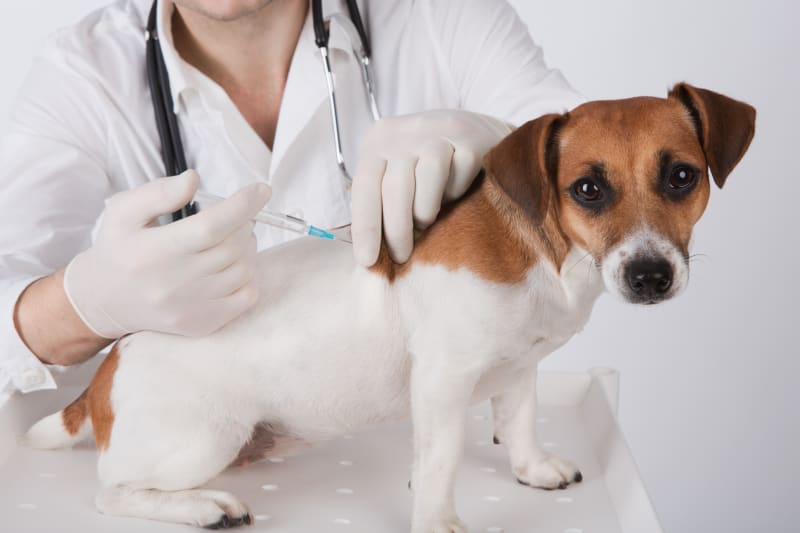I remember the first time I looked at my dog’s vaccine card and realized, I had no idea what half of it meant.
Rabies shot? Okay, I know it’s important… but how often does that even need to happen? Once a year? Every few years? No clue.

If you’re staring at your dog’s vaccination schedule like it’s written in code, you’re not alone. Rabies is one of those scary-sounding things we all know is serious, but the timing for boosters? That part gets fuzzy.
So let’s clear it up. How often do dogs really need the rabies shot, and what should you know to keep your pup protected (and legal)?
Why Rabies Is a Big Deal (Like, Really Big)
Rabies isn’t one of those “eh, probably won’t happen” things. It’s serious. Deadly serious. If a dog catches it, which can happen from a bite by a rabid animal, it’s nearly always fatal. And yeah, humans can get it too.
That’s why rabies vaccinations aren’t optional in most places. They’re legally required. For good reason.
You might never see a rabid raccoon or stray dog in your area, but the risk still exists. Rabies doesn’t play around, and the vaccine is your dog’s best line of defense.
When Does a Dog First Get the Shot?
Puppies usually get their first rabies shot between 12 and 16 weeks old. Some places say 3 months, some say 4. It just depends on your local rules.
It’s often done at the same time as other vaccines, like distemper or parvo. You go in, your pup gets a jab, maybe a treat after, and you’re handed a little certificate that you should absolutely not lose.
Why? Because that paper is gold when it comes to travel, grooming services, doggy daycare, or, heaven forbid, if your dog ever bites someone. Proof of rabies vaccine is the first thing folks ask for.
What’s the Deal with the 1-Year and 3-Year Shots?
Here’s where things can get a bit muddy. The first rabies shot your dog gets? That one usually only lasts one year. After that, your vet might offer you a 1-year booster or a 3-year one.
Some states, cities, or even countries only accept the 1-year dose. Others recognize the 3-year vaccine as long as your dog stays on schedule.
So if you’re in Texas or Florida, that might mean one thing. If you’re up in New York or over in the UK, it could mean something totally different.
The vaccine itself is often the same. It’s the legal rules around it that vary.
So… Every Dog Is Different?
Yes and no. The vaccine routine is pretty standard, but what’s required legally depends on where you live. In the US, most states want to see a rabies booster one year after the first shot, then every three years after that.
But say you move. Or travel. Or board your dog in a different region. You might need to follow their local rules even if your own vet says you’re up to date.
Let’s say you live in Cape Town and are flying your dog to the UK. You’ll need to follow both countries’ rules, and that might include a very specific timeline and documents to prove your dog’s been vaccinated at the right intervals.
What Happens If You Miss It?
Life gets busy. Stuff slips. You miss the date by a few weeks, or even a few months. What now?
First off, don’t panic. Your vet will likely just restart the schedule. That might mean giving a booster and treating it as a new “first shot.” Then another one the following year.
Just don’t try to fudge the dates or ignore it. If your dog bites someone or gets into a scuffle with a wild animal, you’ll be grateful you’ve kept things current.
It’s About Your Dog’s Safety and Yours
Beyond the paperwork and travel plans, the rabies vaccine is about protecting your dog from a brutal disease. And it protects you, your kids, and your neighbors too.
Say your dog gets into it with a stray animal that turns out to be rabid. If your dog’s vaccinated, the odds of anything serious happening are slim. Without it? You’re suddenly looking at quarantines, legal headaches, or worse.
And no one wants that kind of stress, right?
Rabies Shot Checklist
Here’s a quick cheat sheet to keep it all straight:
- Puppy rabies shot at around 3 to 4 months old
- First booster one year later
- After that, either a yearly or three-year vaccine (based on local law)
- Always ask your vet what’s required in your area
- Keep that certificate handy, email yourself a copy just in case
- Double-check vax requirements before travel, boarding, or public events
One Last Note About Vets
Your vet isn’t just there to jab your dog and hand you a bill. They know your local laws, your dog’s health, and what schedule makes sense for your situation.
So if anything feels fuzzy or unclear, just ask. No question is too small when it comes to your dog’s health.
Wrapping It Up
Rabies shots aren’t glamorous. No one throws a party for “vaccine day” or makes a TikTok about their dog’s certificate. But it’s one of the simplest and smartest things you can do to keep your dog safe and out of trouble.
A few pokes over their lifetime, and your pup’s protected from one of the nastiest diseases out there.
So yeah, mark the calendar. Stick a note in your phone. Set a reminder before your next trip.
Because a few minutes at the vet now can save you a whole world of stress later.
When was the last time you double-checked your dog’s rabies record?